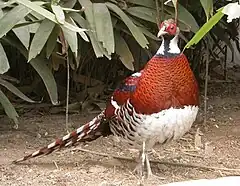| Syrmaticus[1] | |||
| Wagler, 1832[2] | |||
 Przedstawiciel rodzaju – bażant kasztanowaty (S. ellioti) | |||
| Systematyka | |||
| Domena | |||
|---|---|---|---|
| Królestwo | |||
| Typ | |||
| Podtyp | |||
| Gromada | |||
| Podgromada | |||
| Infragromada | |||
| Rząd | |||
| Rodzina | |||
| Podrodzina | |||
| Plemię | |||
| Rodzaj |
Syrmaticus | ||
| Typ nomenklatoryczny | |||
|
Phasianus reevesii J.E. Gray, 1829 | |||
| Synonimy | |||
|
| |||
| Gatunki | |||
| |||
Syrmaticus – rodzaj ptaków z podrodziny bażantów (Phasianinae) w rodzinie kurowatych (Phasianidae).
Zasięg występowania
Morfologia
Długość ciała samic 50–150 cm (ogon 14–45 cm), samców 80–210 cm (ogon 39–160 cm); masa ciała 650–1529 g[10].
Systematyka
Etymologia
- Syrmaticus: gr. συρμα surma, συρματος surmatos „teatralna szata z długim trenem, coś wleczonego, ciągnionego za sobą”[11].
- Graphephasianus (Graphophasianus): gr. γραφη graphē „rysunek, grawerunek”, od γραφω graphō „rysować”; φασιανος phasianos „bażant”[11]. Gatunek typowy: Phasianus soemmerringii Temminck, 1830.
- Calophasis (Callophasis, Calcophasis): gr. καλος kalos „piękny”; nowołac. phasis „bażant”, od średniowiecznołac. phasis avis „bażant”[11]. Gatunek typowy: Phasianus ellioti Swinhoe, 1872.
- Cyanophasis: gr. κυανος kuanos „ciemnoniebieski”; nowołac. phasis „bażant”, od średniowiecznołac. phasis avis „bażant”[11]. Gatunek typowy: Calophasis mikado Ogilvie-Grant, 1906.
- Neocalophasis: gr. νεος neos „nowy, dziwny”; rodzaj Calophasis Elliot, 1872 (bażant)[11]. Gatunek typowy: Calophasis mikado Ogilvie-Grant, 1906.
Podział systematyczny
Do rodzaju należą następujące gatunki[12]:
- Syrmaticus soemmerringii (Temminck, 1830) – bażant japoński
- Syrmaticus reevesii (J.E. Gray, 1829) – bażant królewski
- Syrmaticus mikado (Ogilvie-Grant, 1906) – bażant tajwański
- Syrmaticus ellioti (Swinhoe, 1872) – bażant kasztanowaty
- Syrmaticus humiae (Hume, 1881) – bażant birmański
Przypisy
- ↑ Syrmaticus, [w:] Integrated Taxonomic Information System (ang.).
- ↑ J.G. Wagler. Neue Sippen und Gattungen der Säugthiere und Vögel. „Isis von Oken”. 1832, s. kol. 1229, 1832. (niem.).
- ↑ H.G.L. Reichenbach: Avium systema naturale. Das natürliche system der vögel mit hundert tafeln grösstentheils original-abbildungen der bis jetzt entdecken fast zwölfhundert typischen formen. Vorlaüfer einer iconographie der arten der vögel aller welttheile. Dresden und Leipzig: Expedition der vollständigsten naturgeschichte, 1850, s. xxix. (niem.).
- ↑ Ch.L. Bonaparte. Tableaux paralléliques de l’ordre des Gallinacés. „Comptes rendus hebdomadaires de l’Académie des Sciences”. 42, s. 878, 1856. (fr.).
- ↑ D.G. Elliot: A Monograph of the Phasianidae or family of the Pheasants. Cz. 2. New York: Published by the author, 1871, s. ryc. 13. (ang.).
- ↑ J. Gould: Birds of Asia. Cz. 7. London: Printed by Taylor and Francis, pub. by the author, 1850-1883, s. ryc. 23. (ang.).
- ↑ A.O. Hume. Callophasis humiæ, Sp. Nov.. „Stray Feathers”. 9, s. 461, 1880. (ang.).
- ↑ S.A. Buturlin. „Nasha Ochota”. 12, s. 33, 1908. (ros.).
- ↑ N. Taka-Tsukasa & N. Kuroda. On a New Genus Proposed for Mikado Pheasant of Formosa. „Japanese Journal of Ornithology”. 3 (12-13), s. 1, 1922. (jap. • ang.).
- 1 2 D.W. Winkler, S.M. Billerman & I.J. Lovette: Pheasants, Grouse, and Allies (Phasianidae), version 1.0. W: S.M. Billerman, B.K. Keeney, P.G. Rodewald & T.S. Schulenberg (red.): Birds of the World. Ithaca, NY: Cornell Lab of Ornithology, 2020. DOI: 10.2173/bow.phasia1.01. [dostęp 2020-11-27]. (ang.).

- 1 2 3 4 5 Etymologia za: The Key to Scientific Names, J.A. Jobling (red.), [w:] Birds of the World, S.M. Billerman et al. (red.), Cornell Lab of Ornithology, Ithaca (ang.).
- ↑ Systematyka i nazwy polskie za: P. Mielczarek & M. Kuziemko: Plemię: Phasianini Horsfield, 1821 (wersja: 2020-09-15). [w:] Kompletna lista ptaków świata [on-line]. Instytut Nauk o Środowisku Uniwersytetu Jagiellońskiego. [dostęp 2020-10-27].
This article is issued from Wikipedia. The text is licensed under Creative Commons - Attribution - Sharealike. Additional terms may apply for the media files.